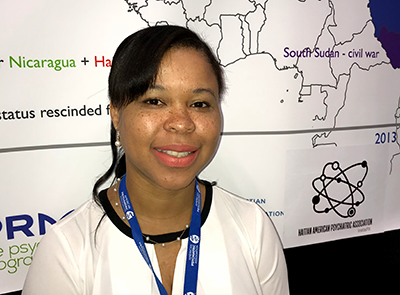Columbia Fellow From Haiti Leads Effort to Help Haitians and Others Losing ‘Protected Status’

Psychiatrist Jennifer Severe, M.D. (pictured above), a public psychiatry fellow at Columbia University, is leading an effort by a small group of physicians to rally support for Haitians and other foreign nationals in the United States residing under Temporary Protected Status (TPS). Part of that effort involved reaching out to attendees at APA’s 2018 Annual Meeting by sponsoring a booth in the Exhibit Hall.
The TPS program is a visa program created by Congress for immigrants who are unable to safely return to their home countries because of ongoing armed conflict, environmental disaster, or other extraordinary conditions.
TPS was granted to Haitians in January 2010 after a devastating earthquake destabilized the country’s fragile infrastructures, resulting in over 300,000 deaths. The Trump administration terminated the program in November 2017 on the basis that the extraordinary conditions under which the status was granted no longer existed in Haiti. The Department of Homeland Security extended Haitians’ stay to July 2019 “to allow for an orderly transition.” (TPS has been terminated for individuals from several other countries. Most recently, TPS was terminated for individuals from Honduras.)
Severe and her colleagues hope to start a pilot program to reach out to Haitian communities in the states with the highest density of Haitians. The goal of the program, called the Pilot Initiative to Empower Haitians on Temporary Protected Status and Support Their Mental Health, is to create a cushioned transition for Haitians returning to their home country (or to permanent residence in the United States when possible). This will be achieved by providing a platform for coordinating psychiatric and psychological support services to TPS holders and information to help TPS holders and their U.S.-based health providers familiarize themselves with the Haitian mental health system and make an educated decision about care options when they return. Such information will include the location of clinics and providers, psychotropic medications available in Haiti, costs of care, and support groups in Haiti that can help returning TPS holders. More information can be accessed here.
“Our goal is to raise awareness around the anguish of the 437,000 people and families affected by the termination of TPS and this includes trainees, colleagues, and patients,” Severe told Psychiatric News.
Severe’s group is supported by the Haitian American Psychiatric Association, the Association of Haitian Physicians Abroad, and Professional Risk Management Services Inc.
(Image: Mark Moran)
|
|
|
|
Advertisement
 |
|
 |
|
|


